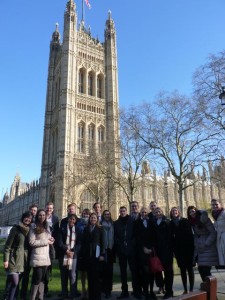
As United Europe’s latest group of Young Professionals gathered in London, the issue of Brexit loomed large. Prime Minister David Cameron had just announced the date for his country’s long-awaited referendum on EU membership. With less than four months to go until the vote on June 23, the Brexit debate at this Young Professionals Seminar served to highlight a profound difference among Europeans: for some, Europe is a matter of the heart. But for others, it is mostly their minds that tell them European integration is a good thing. In Britain in particular, Europe clearly hasn’t been able to win enough hearts.
Certainly, the first day of the London seminar brought many sound reasons why Britain should stay in Europe. The economic effects of Brexit, one participant explained, would probably be very negative. Financial markets might settle after an initial turmoil, but the British economy could seriously suffer in the longer term as foreign direct investment might decline and companies relocate. Another short contribution focused on the language paradox: if Britain pulled out, only the Irish would speak English – the EU’s most important lingua franca – as a native language.
According to current polls, British voters are split on the Brexit vote, Guillaume Amigues said. This young Frenchman working for the pro-EU campaign in Britain also pointed out that the number of undecided is still very high. These are the people that the pro-EU campaigners are trying to convince. Interestingly, their argument does not focus on the merits of the European Union as such. Instead, campaigners are trying to explain to British voters that they are “stronger, better off and safer in Europe” than they would be on their own.
Lord Mandelson’s warnings against Brexit
With such input, the discussion took off at a gallop. For this Young Professionals Seminar, United Europe had brought together 22 young professionals from 16 European nations. Many had a business background, but there were also young people from politics, think tanks and even the United Nations as well as an art historian and an orthopaedic doctor. It is this diversity both in terms of nationalities and of professional backgrounds which make United Europe’s seminars so interesting.
The London seminar was mentored by Baroness Jay of Paddington, a distinguished Labour politician and former Leader of the House of Lords who joined the board of United Europe in 2015. As a passionate European who is very much engaged in the campaign to remain in the EU, Baroness Jay took particular interest in this Young Professionals seminar. It was she who had invited Lord Mandelson as keynote speaker to the seminar, too.
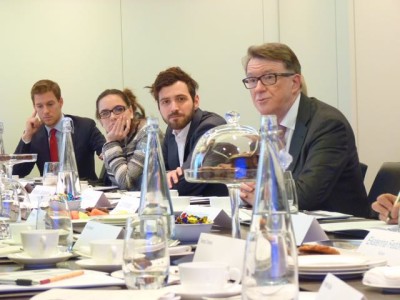
Peter Mandelson, a former British cabinet minister as well as a former EU Commissioner, was an impressive figure, soft spoken, witty and eloquent. As a board member of the “Britain stronger in Europe” campaign, he also concentrated on the Brexit issue. “I believe that there is no better alternative for Britain outside the EU,” Lord Mandelson said. He particularly warned against the illusion that on its own, Britain would be able to negotiate much more advantageous trade deals than as a member of the EU.
Clearly, Brits do hear that message, and even the more sceptical among the British participants at the seminar said they would probably end up voting against Brexit on June 23. Yet they also made clear that much of their heart was pulling them the other way: towards a break with what many British see as an overly intrusive and undemocratic bureaucracy in Brussels and towards more national sovereignty. An ideal EU, in their view, would interfere much less in a country’s trade or foreign policy.
How to bring back growth
Continental Europeans, it turned out, tend to take a profoundly different view of the EU. For most of them, there is a European project that stands for peace and reconciliation. Not just through their heads, but in their hearts as well, they are committed to the concept of an “ever closer union.” A young Italian participant pleaded for a much closer integration of Europe’s core in order to overcome the centrifugal forces currently at work in the EU. On a different note, a Danish participant put forward a model of Europe where countries could freely opt in and out of common policies in all areas.
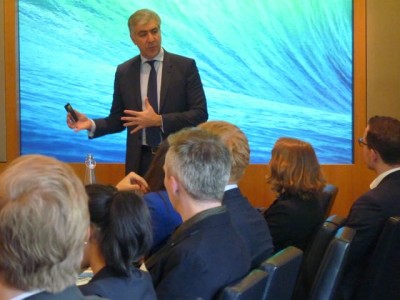
On this first day, the seminar was hosted by Morgan Stanley at Canary Wharf. But Morgan Stanley didn’t just contribute rooms, food and drinks – though they were all marvellous – but also an outstanding speaker. Reza Moghadam had been with the International Monetary Fund for 22 years before joining Morgan Stanley in 2014 where he now serves as Vice President of Global Capital Markets and Head of Sovereign Debt Coverage. His last posting at the IMF had been Director of the European Department, responsible for interacting with European policy makers and institutions during the Eurozone crisis.
It was Mr. Moghadam who introduced the wider theme of this Young Professionals Seminar. Beyond Brexit, what other factors are pulling Europe apart; and what can be done to counter them? Economic convergence brought EU countries closer until the introduction of the Euro. Then, however, indicators show that the North and the South moved apart; a divide deepened by the Eurozone crisis. Even now, Mr. Moghadam concluded, countries like Germany could do much more to boost investment, bring back growth and re-balance Europe along sustainable lines.
“There is a history of European identity and culture that binds us”
Unemployment clearly is a root cause for dissatisfaction with the EU; in that sense the fourth industrial revolution with its huge impact on the labour market is certain to bring new risks for Europe. But there are other issues as well: the influx of refugees which is not only putting enormous strain on European solidarity, but also bringing out some ugly elements of racism. At the same time, the refugee crisis is eroding one of the proudest achievements of European integration, the abolition of border controls in continental Europe. Finally, nationalist movements in Catalonia and elsewhere are creating a huge amount of uncertainty for the future of national states but also of the EU.
With this discussion, the London Young Professionals seminar had moved well into Day Two. We had also shifted location and were now – thanks to the support of Baroness Jay – gathered in a meeting room of the House of Lords. We were taken on a fascinating tour of Britain’s Houses of Parliament at the end of our working day, gaining insight into what 900 years of a proud parliamentary history can mean for a nation.
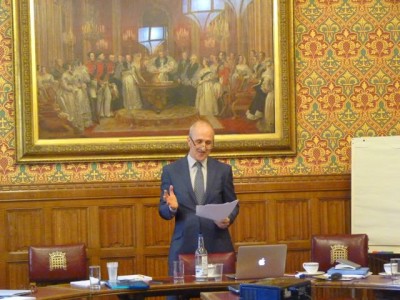
But back to the day’s work. The second day of the London seminar began with one more perspective on Brexit, this time given by Sean Gorvy, CEO of Hanover Acceptances, an international private investment group focusing on real estate, soft drink manufacture, agribusiness and venture capital. Together with Morgan Stanley, Hanover Acceptances were the main supporters of this Young Professionals Seminar – many thanks to their generosity.
The Raft of the Medusa
Mr. Gorvy looked at EU membership through the lens of his business: the single market which facilitated the expansion of his soft drink business; the bloc’s protectionism which hinders citrus imports from South Africa; and Brexit, which might have a negative impact on the housing market in London. All in all, Mr. Gorvy concluded, his head might actually lead him to conclude that Hanover Acceptances might do better if Britain left the EU. But his heart was very much in favour of Europe. “There is a history of European identity and culture that binds us,” Mr. Gorvy said. “There is an emotion beyond any economic or political opportunity.”
Certainly, the notion of a common culture in Europe spreads far beyond the boundaries of today’s European Union. In the next bloc of short contributions, participants both from inside and from outside the EU explained how people in their countries see Europe. It began with an academic overview from Elitsa Kortenska who is researching attitudes towards EU enlargement at the University of Leiden. This was followed by viewpoints from southern and from central Europe. Finally, a Serb and a Russian explained about their countries’ ambivalence towards the EU.
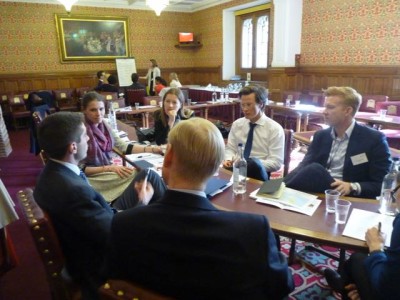
It was fascinating. However, time was beginning to run out (this has happened before and we will try do things a bit differently at our next seminar). In the final round of short presentations, participants put forward their ideas of how Europe could be more faithful to its values and create a stronger sense of identity at the same time. The seminar’s final contribution focused on art: taking the 19th century painting “The Raft of the Medusa” by Théodore Géricault, and explaining both its wider European roots and its current impact in the context of the refugee crisis.
Keen to shape Europe’s future
In three working groups, participants then worked on drawing up conclusions from the discussions they had taken part in over the past two days. Their focus was on what can keep Europe together: the values that unite Europe, but also the policies that can serve to underpin those values. This wasn’t an easy task: when choosing the participants, the United Europe team had gone to great length to make sure that people of very different European persuasions were included. Of course, this made it much more difficult in the end to arrive at meaningful conclusions given the scale of the issue and the scarcity of time.
But judge for yourselves: these are the conclusions of the London seminar. The 22 young professionals focused on two main points: communicating Europe’s achievements and concentrating on solving the most pressing problems. This would have to include resolving the refugee crisis and finding ways to rekindle growth and investment.
Was it too ambitious to want to look at both the specific issue of Brexit and the wider topic of keeping Europe together in just two days? Possibly. The London seminar brought together very diverse opinions and perspectives. But it also showed that United Europe’s young professionals share not only a passion for learning and debating, but are keen to contribute to shaping Europe’s future together.
Photos: Jenny Paul


